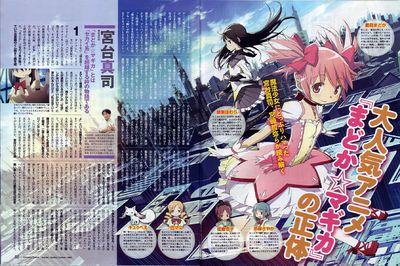Spa Weekly! 2011-07-19
Why Grown-up Men Also Cried After They Watched Puella Magi Madoka Magica
Translation courtesy of symbv from evageeks forum
Translator's comment: There was a long discussion between five "noted commentators" on the anime, why it was so popular even outside the usual anime fandom, and what it means to contemporary Japanese and the society. Its online site has one short report, named "Why grown-up men also cried after they watched PMMM" Source: [1]
「最後にね、友情がね、奇跡を起こすんですよ……」と切なげに語るのは、精密機械メーカーで営業職の中山亨さん(仮名・38歳)だ。 "It was the ending.. There was friendship, and it made a miracle...". Nakayama-san (age 38), working in a precise instrument maker company, said with some sadness.
「まどかとさやか、まどかとマミさん、さやかと杏子、いろんな組み合わせの友情が描かれますが、すべて過酷な運命に翻弄され報われない結果を迎えます。でも、まどかとほむらだけが最後の最後に奇跡を起こす。しかも、まどかは因果を受け入れ、せっかく成就した友情という絆をも軽々と乗り越えてしまう。なんか、その奇跡に立ち会えたことに感謝したくなるんですよ」
"There were various friendship pair-ups like Madoka and Sayaka, Madoka and Mami, Sayaka and Kyouko, in the show, and all of them were tossed around by cruel fate and met an unfulfilled end. But there was also Madoka and Homura - only they managed to cause a miracle at the end of the end. Not only that, Madoka accepted all the causes and effects and calmly got over the hold-up resulting from a friendship that finally bore fruit. Well, it made me want to say thanks for being able to encounter such a miracle."
保険会社に勤める斉田哲治さん(仮名・42歳)は「僕も、まどかのように取り柄がないんですよ。『僕には何ができるんだ?』って、ずっとそういうふうに悩んでいました」と告白する。
Saida-san (age 42), who worked in an insurance company, said "I don't think I have the merit as shown by Madoka. I have always been troubled by the thought 'What am I able to do?'"
「いわば凡人であるまどかが、選択を繰り返し何かを得たり失ったり。だからこそ最後の選択に心が震えるわけです。お母さんが背中を押してくれるシーン、歴代の魔法少女たちを慰撫するシーン、あぁ、もう目から汗が……。あ、でも、杏子も好きですよ」
"Madoka is a so-called "ordinary person" and she came across repeated occasions of choices and through the choices won something and lost something. And because of all these I could feel my shuddering at my heart when I saw her final choice. The scene when her mother came to back her up; the scene when she comforted all those mahou shoujo in history...Ah! My eyes are already watering.... Ah, and also I really love Kyouko!"
「まどかの行為は滅私のようで、その実、愛する人たちとの関係性を内包し続けるという自己愛で、本人もそれに自覚的」と気難しい顔で語るのは高城亮さん(仮名・34歳)。
Takagi-san (age 34) said with a moody face, "It looked as if Madoka's behavior was all altruistic, but in its core, there was also the self-love which also continued to be inclusive of the links towards all those she loved. I am also very much aware of such within myself."
「周囲や視聴者が感じがちな悲しみは、『忘却されること』が『死』と近似的だからだろうけど、彼女は死んでいないので、本人は案外平気だと思う。宗教、倫理規範のない日本におけるボランタリズムのあるべき姿にも通じ、『ボランティアが好き』と言うたびに周囲に怪訝な顔をされてきた自分を肯定してくれた気がするんです」
"The sadness often expressed by the viewers and those around me is due to the thought that "being forgotten" is so close to "death," but since she has not died, I myself am surprisingly, fine with it. It can be reflected back into how volunteerism should be like in Japan where there is no religion and no external moral standard. When I told everyone that "I love to volunteer" and they showed me dubious faces. I feel that this anime confirms that I am in the right."
聞けば、社会学者の宮台真司氏、評論家の宮崎哲弥氏、幹細胞生物学者の八代嘉美氏といった“知の巨人”たちも同様に『まどマギ』にハマっているというではないか。そこで、彼らにも現在発売中の週刊SPA!7月19日号で縦横無尽に語ってもらった。
Editors of Spa: When we asked around, we found that "big names of intelligentsia" like sociologist Shinji Miyadai, commentator Tetsuya Miyazaki, stem cell biologist Yoshimi Yashiro are also big fans of Madoka Magika. And we have invited them to talk freely about this anime in the latest July 19th issue of Weekly Spa.
The five commenting on Madoka in the Spa Weekly are (all links are in Japanese) [2]:
- Shinji Miyadai - sociologist [3]
- Tetsuya Miyazaki - noted commentator [4]
- Yoshimi Yashiro - stem-cell biologist [5]
- Kaichiro Morikawa - associate professor, Meiji University [6]
- Tetsuya Isozaki - CPA, net business and finance blogger [7]
Shinji Miyadai (sociologist)
Translation courtesy of symbv from evageeks forum
Translator comment: You can see how "high criticism" of anime in Japan is like. In fact 2ch [Madoka fans] do not think much of the point of view, particularly when he said that Japan now is not good for a cheerful show like K-On.
Shinji Miyadai is a Professor of Urban Liberal Studies in Tokyo Metropolitan University. Specialized in Social System Theory. Recent books written include “Earthquake and Nuclear Energy – The Crisis from Now On” co-authored with video journalist Tetsuo Jinbo.
“Madoka Magica” is a story about bonds that surpassed “Sekai-kei”
In 1979 there was “Mobile Suit Gundam”; in 1995 there was “Neo-Genesis Evangelion” (Eva). In a 15-year cycle there is an epoch-making anime and “Madoka” clearly came out from this trend. When “Eva” was out it was precisely 1995 when the mood of fin de siècle was very much in the air as the great earthquake of Hanshin-Awaji and the incident of Aum Shinrikyo sect happened. After that, there were many works of “sekai-kei” in which the mystery of the “world” is directly connected to the character's own issues. I believe “Madoka” is a story that overcame the trap of “sekai-kei” where the feeling of the self-consciousness reached a dead-end.
In Sekai-kei, as long as the protagonist is recognized by the surrounding then anything is OK, but it is the opposite in Madoka: Even though the surrounding is telling you that “Because only this 'society' will give you the recognition, do not leave,” you make the decision that “I will still leave.” What made this development a reality is the bond between Madoka and those surrounding her. Although Madoka did not notice the bond that gradually grew out of bits and pieces everyday, she eventually noticed its cause and effect and came to accept her role. And so even we are talking about Mahou Shoujo, it is not really about transformation but a body flip-over. She is a heroine who flips over herself and cannot un-flip back to what she was.
This is in synch with the earthquake I mentioned earlier. In a crisis situation, the bonding will be tested in all ways imaginable. What would be the means you can still rely till the end? Even though we may hold certain worry that such bond may be just as a playful thing, we cannot live without bonds [to each other]. I feel that it managed to reproduce the mood of year 2011.
It would be difficult to produce a cheerful slice-of-life drama like “K-On!!” in a Japan after the earthquake, and “Madoka” may be the antithesis to “shitty” midnight anime in 00s that had become something that only some of the males could enjoy.
Another thing that is important is the element of “wish”. Even though I meant well but then I got bound to something undesirable – it was just like what we experienced through the earthquake. It is also the cause of miscommunication. In Episode 3, Madoka's dialogue, “I did not ask for the cellphone number” can also be interpreted as a metaphor for that. The flip side of making a wish also means grudge and resentment remain. And originally this was the general principle behind Greek tragedies. All the events in “Madoka” also established the cause and effect along the extension line of the conducts of the characters. There is a “world” inside the “society”. In contrast, in “Eva” the absurdities that were the “Angels” came from a “world” that was outside the “society”. It may be a thinking from the school of romanticism, the drama [in sekai-kei] always tend to depend on an outside source. This common issue faced by sekai-kei was overcome by the bonding in “Madoka”.
An ordinary young girl noticed the connections that had been supporting her, made a flip-over, and fulfilled her duty. As a structure for a story, it is truly moving. I could not hold back my tears at the end. I can watch it many many times. It is clearly a meaningful work no matter if an ordinary girl watches it or a grown-up man like me watches it.


